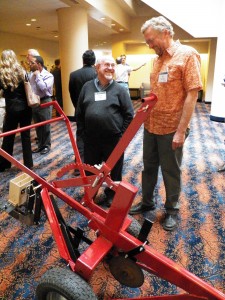SANREM in Cincinnati: Researchers attend Annual Meeting

Harry Rea, USAID AOR, and PI Jay Norton with a prototype of the multifunctional implement (MFI). The MFI substantially increases the efficiency of lo/no-till cultivation (lo/no-till being one of the three keystones of conservation ag as defined by the FAO). The MFI will play a key role in the future of CAPS projects in eastern Uganda and Kenya.
Over sixty researchers and students from twelve different universities, as well as other NGO partners and representatives from USAID, convened in Cincinnati, Ohio on October 21- 22 for the Feed the Future Food Security Innovation Lab: Collaborative Research on Sustainable Agriculture and Natural Resource Management program’s annual meeting. SANREM Director Dr. Adrian Ares, who led the meeting, outlined how SANREM’s multidisciplinary approach, science-based research, and partnerships with a diverse array of stakeholders contribute to the CRSP’s efforts to increase smallholders’ food security and adaption to climate change through conservation agriculture production systems (CAPS).
Highlighting the program’s multidisciplinary approach researchers presented SANREM’s cross-cutting research activities that assess research findings across the seven long-term research award projects located in thirteen countries. These research activities include technology networks, economic and impact analysis, soil quality and carbon sequestration, and gender perspectives on CAPS.
Additionally, SANREM researchers emphasized the importance of working with key partners as well as engaging farmers through participatory approaches. Principal Investigator (PI) Dr. Jay Norton from the University of Wyoming led a thoughtful discussion on the different approaches researchers can take to engage farmers through co-innovation, workshops, advisory committees that engage farmers, outreach activities, and building on farmers’ conservation practices.
Throughout the meeting many of the PIs noted the mutual benefits of working with students to achieve research goals and build students’ capacity through long-term training. During a broader discussion on documenting those benefits, Dr. Makoala Marake, a former INTSORMIL CRSP student who is now a Co-PI for SANREM’s CAPS project in Lesotho and Mozambique, noted that while it can take time to see the outcomes of an investment in degree training, the value is there. He pointed to his own opportunity as a CRSP-funded student to give back to the program. Current CRSP students originally from Ecuador, Ghana, Kenya, the Philippines, Cambodia and the U.S. participated in the meeting.
Other highlights of the meeting included a poster session and concurrent disciplinary discussions on agronomy and soil science led by SANREM CRSP Assistant Director Dr. Michael Mulvaney. PI Dr. Jeff Alwang, an agronomy professor at Virginia Tech, also led a discussion on socio-economics where researchers set collective goals and shared ideas for the upcoming year.
The SANREM CRSP annual meeting was organized to precede the tri-societies of the American Society of Agronomy, Crop Science Society of America, Soil Science Society of America international (ASA-CSSA-SSSA) annual meeting where the SANREM CRSP hosted a special session on conservation agriculture attended by leading conservation agriculture experts.
